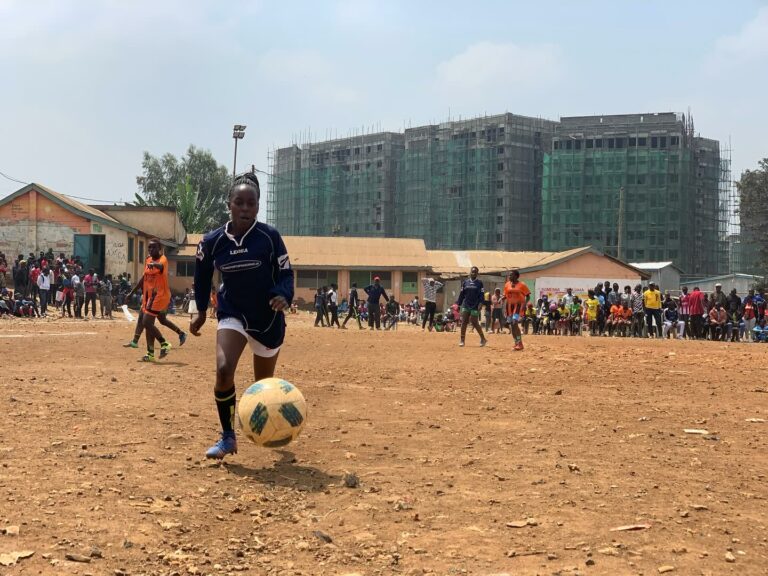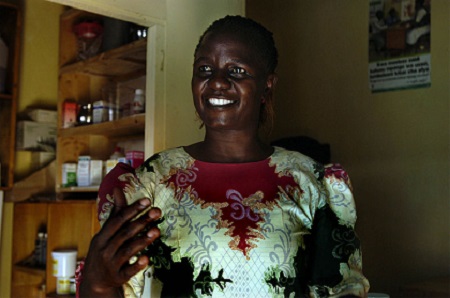There are over 1,400 slums in Kenya characterized by overcrowding, poverty, tenure insecurity, limited access to healthcare and education, and lack of infrastructure. In these communities, infectious diseases spread rapidly, malnutrition limits children’s abilities to reach their full potential, and poor sanitation contributes to thousands of preventable deaths every year. Gender inequality, limited access to education, and high levels of unemployment are all barriers that prevent individuals and communities from thriving.
Though residents are talented, resilient, and entrepreneurial, many lack the opportunities needed to break the cycle of poverty.

Approximately 1 in 8 people live in informal settlements worldwide, and this proportion is only expected to grow with urbanization.
people live in informal settlements worldwide
homes often house 8-10 people.
settlements are located across Kenya
Tabitha Festo, a nurse living in Kenya’s largest slum, Kibera, co-founded CFK Africa out of deep love for her community and we strive to continue her legacy of working alongside community members to identify and meet essential needs – this commitment is in our DNA and fuels our work.

Who We Are
CFK Africa is a registered NGO in Kenya and 501(c)(3) nonprofit in the U.S. that empowers youth in slums.
Quick Links
Stay Connected
Website Design by Carrboro Creative | Photo credit site-wide: CFK Africa
Located in western Kenya, Kajiado County has informal settlements concentrated near its two urban centers: Ongata Rongai and Kajiado town.
CFK Africa began work in Kajiado County in 2022. We have supported the following interventions and are currently working with community members to develop additional health, education, and economic development programs.
With an average urbanization rate of over 3%, Kiambu County is the second-most populated county in Kenya and is quickly becoming one of the most urbanized areas in the country, which has led to the proliferation of informal settlements.
CFK Africa began work in Kiambu County in 2021. We have supported the following interventions and are currently working with community members to develop additional health, education, and economic development programs.
Kilifi County is located along the Kenyan coast, and most of its population resides in rural or peri-urban areas. The county’s informal settlements are largely aggregated around Malindi and Kilifi town, which are the area’s largest urban centers.
CFK Africa began work in Kilifi County in 2022. We have supported the following interventions and are currently working with community members to develop additional health, education, and economic development programs.
Kisumu County is home to the third-largest city in Kenya and has a coastline on Lake Victoria. Estimates indicate that over 40% of people living in Kisumu city reside in informal settlements surrounding the area.
CFK Africa began work in Kisumu County in 2022. We have supported the following interventions and are currently working with community members to develop additional health, education, and economic development programs.
Nakuru County is one of the fastest-growing areas in Kenya. Due to this rapid urbanization, the county has seen a proliferation of informal settlements, especially surrounding its two major urban centers of Nakuru and Naivasha.
CFK Africa began work in Nakuru County in 2022. We have supported the following interventions and are currently working with community members to develop additional health, education, and economic development programs.
Machakos County is home to one of the oldest towns in Kenya, and informal settlements in the county are largely concentrated around the rapidly growing towns of Machakos and Mavoko.
CFK Africa began work in Machakos County in 2022. We have supported the following interventions and are currently working with community members to develop additional health, education, and economic development programs.
Located along the coast, Mombasa is a popular holiday destination and the second-most urbanized county in Kenya. Studies estimate that the county is home to more than 70 informal settlements.
CFK Africa began work in Mombasa County in 2022. We have supported the following interventions and are currently working with community members to develop additional health, education, and economic development programs.
Nairobi is the most urbanized county in Kenya and grows at a rate of approximately 4% per year. Over half of the county’s population lives in informal settlements, such as Kibera, which is one of the largest informal settlements in Africa.
Founded in Kibera in 2001, CFK Africa remains headquartered in Nairobi and works with community members to operate the following interventions: